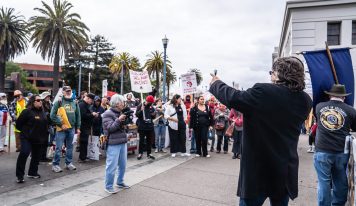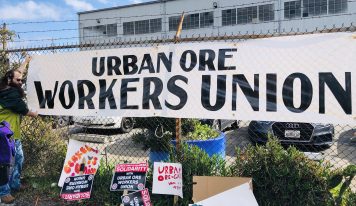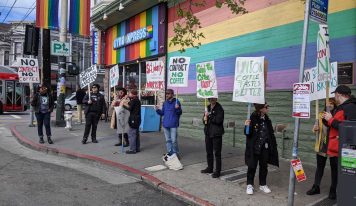San Francisco — During the world-historical COVID-19 pandemic and the worst fire season in California history, the unhoused population of San Francisco has had to undergo one of the most harrowing years in living memory. The city government has lagged behind public opinion to deal with this crisis, degrading the public health response to COVID-19.
Due to the city’s willful inaction, COVID-19 has become widespread through the unhoused community. This has dramatically impaired the city’s ability to slow the pandemic, since contact tracing is nearly impossible in unsheltered populations, particularly in a city where these people are routinely swept from the streets by order of our mayor, London Breed.
When the Board of Supervisors unanimously voted in the Spring of 2020 to move some of the unhoused population into hotels in the Spring, funded by federal and state money, Mayor Breed refused to spend the money to do so. This was happening even as the city’s hotels laid empty.
Mayor Breed eventually caved to provide housing in hotel rooms, though only about a third of what the Board specified in April. Breed is now attempting to move these few housed people out of the hotel rooms in the winter months, though there is still plentiful funding from the federal and state governments to continue the program.
But stepping into the government’s place in handling the crisis is the Hotels Not Hospitals project. The project has housed 7 people since its inception in April of 2020, and has been able to cut through the bureaucratic red tape to provide necessary housing to San Francisco’s most vulnerable population.
At the same time, it is able to do so at a fraction of the cost the City pays. Per person, the City pays $260 a night per person. Hotels Not Hospitals can house people at just under 50% of the city’s cost per room, since it does not pay officials to (in the words of Mayor Breed) “babysit” the unhoused. Hotels Not Hospitals has raised over $46K on GoFundMe, all of which goes directly to housing vulnerable people.
The Supervisors continue to debate the merits of the hotels plan. Supervisor Dean Preston is in favor of the program and hopes to expand it to become a permanent program. In his words, the program is “unbelievably cost-effective”.
Many in city government, including City Controller Ben Rosenfield, believe that there is no evidence that the Federal Emergency Management Agency’s month-to-month reimbursement of 75 percent of the SIP hotel leasing expenses will end this year given that the Biden administration seems likely to supply billions of dollars for affordable housing. This would seem to suggest that this is not a financial issue to those who oppose SIP hotel leasing, despite their rhetoric.
In fact Abigail Stewart-Kahn, the Director of the Department of Homeless and Supportive Housing, said that one reason for ending the SIP hotel program is to ensure that homeless do not end up comfortable and have “no motivation to take steps to exit homelessness.”
Beyond the fact that the city official in charge of housing vulnerable people does not believe that housing is a valid objective in-and-of-itself, this suggests that many in government do not understand the basic data around homelessness. A landmark Federally-commissioned review stated matter-of-factly that “only rarely do even chronically homeless people remain homeless indefinitely”, and that “there appears to be a direct relationship between the reduced availability of low-cost housing and the increased number of homeless people.”
In fact, data around homelessness and housing stability counters the supposed concerns of city officials who seem to want to leverage poverty as a motivator. A 2005 Vera Institute study concluded overwhelmingly that those with intervening periods of housing stability, particularly in the form of subsidized housing, had the lowest rates of re-entry into homelessness.
As for Hotels Not Hospitals, they are focused on the goal of providing housing in spite of the City’s failings. Tyler Rougeau, an organizer from the project, says “The City just announced $3.5M in small business loans at the same time they say they cannot afford the SIP hotels. This is in my opinion about prioritizing economic recovery, which means facilitating capital’s profit, not a sustainable way to meet human need.”
As the statewide eviction crisis looms in 2021, more people will be forcibly removed from their homes and will have to live unhoused in a San Francisco that keeps hotel rooms empty while thousands are cold in the streets. While the city government fails in its most basic responsibilities, at least some citizens are stepping up.





